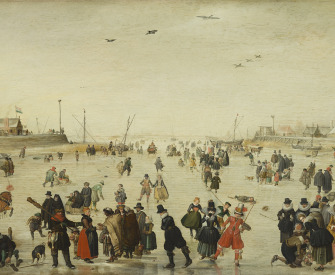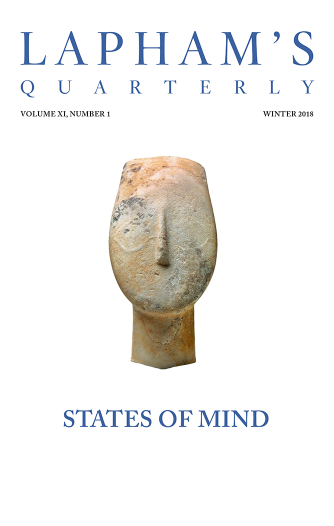[Enter Juliet above at a window.]
Romeo
But, soft! What light through yonder window breaks?
It is the east, and Juliet is the sun!
Arise, fair sun, and kill the envious moon,
Who is already sick and pale with grief,
That thou her maid art far more fair than she.
Be not her maid, since she is envious.
Her vestal livery is but sick and green,
And none but fools do wear it. Cast it off.
It is my lady; O, it is my love!
O that she knew she were!
She speaks, yet she says nothing. What of that?
Her eye discourses; I will answer it.
I am too bold; ’tis not to me she speaks.
Two of the fairest stars in all the heaven,
Having some business, do entreat her eyes
To twinkle in their spheres till they return.
What if her eyes were there, they in her head?
The brightness of her cheek would shame those stars,
As daylight doth a lamp; her eyes in heaven
Would through the airy region stream so bright
That birds would sing and think it were not night.
See how she leans her cheek upon her hand!
O that I were a glove upon that hand,
That I might touch that cheek!
Juliet
Ay me!
Romeo
She speaks:
O, speak again, bright angel! For thou art
As glorious to this night, being o’er my head
As is a wingèd messenger of heaven
Unto the white-upturnèd wond’ring eyes
Of mortals that fall back to gaze on him
When he bestrides the lazy-pacing clouds
And sails upon the bosom of the air.
Juliet
O Romeo, Romeo! Wherefore art thou Romeo?
Deny thy father and refuse thy name;
Or, if thou wilt not, be but sworn my love,
And I’ll no longer be a Capulet.
Romeo
[aside] Shall I hear more, or shall I speak at this?
Juliet
’Tis but thy name that is my enemy.
Thou art thyself, though not a Montague.
What’s Montague? It is nor hand, nor foot,
Nor arm, nor face, nor any other part
Belonging to a man. O, be some other name!
What’s in a name? That which we call a rose
By any other name would smell as sweet.
So Romeo would, were he not Romeo called,
Retain that dear perfection which he owes
Without that title. Romeo, doff thy name;
And for that name, which is no part of thee,
Take all myself.
Romeo
I take thee at thy word.
Call me but love, and I’ll be new baptized;
Henceforth I never will be Romeo.
Juliet
What man art thou that, thus bescreened in night
So stumblest on my counsel?
Romeo
By a name
I know not how to tell thee who I am.
My name, dear saint, is hateful to myself,
Because it is an enemy to thee.
Had I it written, I would tear the word.
Juliet
My ears have yet not drunk a hundred words
Of that tongue’s uttering, yet I know the sound.
Art thou not Romeo, and a Montague?
Romeo
Neither, fair maid, if either thee dislike.
Juliet
How camest thou hither, tell me, and wherefore?
The orchard walls are high and hard to climb,
And the place death, considering who thou art,
If any of my kinsmen find thee here.
Romeo
With love’s light wings did I o’erperch these walls;
For stony limits cannot hold love out,
And what love can do, that dares love attempt.
Therefore thy kinsmen are no let to me.
Juliet
If they do see thee, they will murder thee.
Romeo
Alack, there lies more peril in thine eye
Than twenty of their swords! Look thou but sweet,
And I am proof against their enmity.
Juliet
I would not for the world they saw thee here.
Romeo
I have night’s cloak to hide me from their eyes;
And but thou love me, let them find me here.
My life were better ended by their hate
Than death proroguèd, wanting of thy love.
Juliet
By whose direction found’st thou out this place?
Romeo
By love, that first did prompt me to inquire.
He lent me counsel, and I lent him eyes.
I am no pilot; yet, wert thou as far|
As that vast shore washed with the farthest sea,
I would adventure for such merchandise.
Juliet
Thou knowst the mask of night is on my face;
Else would a maiden blush bepaint my cheek
For that which thou hast heard me speak tonight.
Fain would I dwell on form—fain, fain deny
What I have spoke; but farewell compliment!
Dost thou love me? I know thou wilt say, “Ay”;
And I will take thy word. Yet if thou swear’st,
Thou mayst prove false. At lovers’ perjuries,
They say Jove laughs. O gentle Romeo,
If thou dost love, pronounce it faithfully.
Or if thou thinkest I am too quickly won,
I’ll frown, and be perverse, and say thee nay,
So thou wilt woo; but else, not for the world.
In truth, fair Montague, I am too fond,
And therefore thou mayst think my havior light;
But trust me, gentleman, I’ll prove more true
Than those that have more cunning to be strange.
I should have been more strange, I must confess,
But that thou overheard’st, ere I was ware,
My true-love passion. Therefore pardon me,
And not impute this yielding to light love,
Which the dark night hath so discoverèd.
Romeo
Lady, by yonder blessèd moon I vow,
That tips with silver all these fruit-tree tops—
Juliet
O, swear not by the moon, th’ inconstant moon,
That monthly changes in her circled orb,
Lest that thy love prove likewise variable.
Romeo
What shall I swear by?
Juliet
Do not swear at all;
Or, if thou wilt, swear by thy gracious self,
Which is the god of my idolatry,
And I’ll believe thee.
From Romeo and Juliet. As he did with many plays, Shakespeare drew the inspiration for the plot from a previous work, in this case improvising on the theme from Arthur Brooke’s 1562 poem “The Tragicall Historye of Romeus and Iuliet.” One of the bard’s early tragedies, Romeo and Juliet introduced the phrase “star-cross’d lovers” into the lexicon.
Back to Issue


